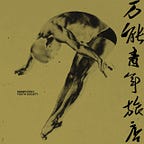Hero Movies: Scapegoats
Why we love them
Preface
Lately, it seems like the more my work is exploding, the more I am obsessed with writing movie reviews. But that was not my initial intention, I just want to express the intertwining thoughts floating in my mind, the meandering flows which I am unable to sort out by my own words, by the wider bandwidth of the film genre. This is why Drive My Car, Knight of Cups and Arrival were being delivered.
In this article, we are not going to talk about any specific film, but with a specific focus on the movies with heroes which have such a large supporting community these days including me being fascinated by the 007 franchise since adolescence.
Shall we begin?
Why
So the first question is: why are we so infatuated with hero movies?
As we grow older and older, we may feel the time in a more concessive approach — we are drifting in reality to comprehend time. Moreover, we aim to chase some breath of detachment — the detachment of reality. However, we know that deep in our minds: detachment from reality is the road to escapist fantasy. The one reason why hero movies are popular is that it was rather vague with their language, which allowed men, like myself, to project their own meaning onto them. What hero movies seem to suggest is that this is an essence to manhood that is completely detached from everything else, that stands apart from all external elements, and subsequently seems to insist that a man’s main focus should be on reconciling the nebulous essence with every other facet of his life like some superhero alter ego. And so even though it encourages healthy connection, it also rather uncritically assumes there is something distinct in the first place. This disconnects heroic masculine purpose and everything else. Because his heroic masculine purpose also makes him a fundamentally tragic hero. As a result, he is a protector of a world he himself cannot inhabit.
How
The masculine purpose of Heroic men in movies becomes, to some extent, an escapist fantasy. By heightening all the meaningful, fulfilling and generally cool things about following your heroic masculine purpose, and by playing down the real toll this takes on your relations and community, we remain identified with the heroes, and by extension, with the idealised view of heroic masculine purpose. Because from this point of view, we are allowed not to care about these trivialities. On top of that, to really make the fantasy complete, in the end, our heroes are often redeemed for their behaviour as all the other characters eventually come around to them — the frustration of other men turns into reluctant respect or even envy.
Thus, heroes die, but they don’t do laundry.
What
Similarly, the myth of heroic masculine purpose is also an ideological concept: it doesn’t just want you to feel happy or fulfilled, it wants you to feel virtuous, it wants you to feel righteous, but not about all the right things.
We all believe we’d run into the burning building,
but until we feel that heat, we can never know.
If I see the situation as just being too small to be truly demanding of my heroism: “You know: I’ll act when it really matters when there are real stakes involved”. Of course, such a moment never really came. More often than not, the truth was that it was just inconvenient and that I was just being lazy and selfish. And it took me way too long to realise that’s not how real virtue works. Where do such rationalisations become excuses? Do we need to conflate self-actualization with altruism? To what extent have we muddled the water of turned morality? To what extent we have begun seeing the trivial as the essential? And subsequently, grew to protect the convenience if it were vital? And the selfish as if it were selfless? What does it even look now like to make a true sacrifice, to be truly committed to a community?
There is a fine line between heroic purpose and grandiosity, between serving others and serving yourself.
Ultimately, a man should not ask what the meaning of his life is, but rather must recognize that it is he who is asked. that it is up to him to answer not in some definitive, abstract cosmic sense, nor with some heroic masculine purpose, but continuously, in the small, seemingly, insignificant ways, every day.
Island
Frankly speaking, the quest for meaning is made up of a series of concrete assignments demanding concrete fulfilment, not one but a multitude of purposes, found not within as some vaguely defined masculine essence of the gift at the core of a man’s being, but outside of oneself. In the acts that really matter demonstrate that you are not an island, you do not exist on your own.
And isn’t that what true responsibility comes down to? The acceptance of your place in a greater whole, of your inherent embeddedness within a complex web of relations and connections. Thereupon, the scapegoat of hero movies comes to sirens which everyone else these days needs to take into some consideration.
At the end of the day, Bond, first impression last. Take me back to the night we met.
(pictures will vary)
